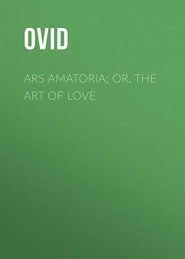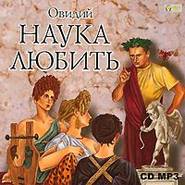По всем вопросам обращайтесь на: info@litportal.ru
(©) 2003-2024.
✖
The Amores; or, Amours
Настройки чтения
Размер шрифта
Высота строк
Поля
167 (return (#x2_x_2_i29))
[ To be reckoned.—Ver. 2. The Nymphs of the groves were called [Footnote vanâtai ]; and perhaps from them Nape received her name, as it is evidently of Greek origin. One of the dogs of Actæon is called by the same name, in the Metamorphoses, Book iii. 1. 214.]
168 (return (#x2_x_2_i29))
[ Giving the signale.—Ver. 4. 'Notis' may mean here, either 'hints,]
169 (return (#x2_x_2_i29))
[ Carry these tablets.—Ver. 7. On the wax tablets, see the Note to the Pontic Epistles, Book ii. El. 9.1. 69, and the Metamorphoses, Book ix. 1. 521, with the Note.]
170 (return (#x2_x_2_i29))
[ So well filled.—Ver. 7. 'Peraratas' literally means 'ploughed over'; which term is properly applied to the action of the 'stylus,' in ploughing through the wax upon the tablets. Suetonius relates that Julius Caesar, when he was murdered in the Senate House, pierced the arm af the assassin Cassius with his 'stylus.']
172 (return (#x2_x_2_i30))
[ A long answer.—Ver. 19. She is to write at once, on having read his letter through. This she could do the more readily, as she could use the same tablets, smoothing the wax with the broad end of the 'graphium,' or 'stylus.']
175 (return (#x2_x_2_i31))
[ Holding the pen.—Ver. 23. 'Graphium' was the Greek name for the 'stylus,' or pen used for writing on the wax tablets. It was generally of iron or copper, but sometimes of gold. The case in which it was kept was called 'graphiarium,' or 'graphiaria theca.']
176 (return (#x2_x_2_i31))
[ Of worthless maple.—Ver. 28. He calls the wood of the tablets 'vile,' in comparison with their great services to him: for, according to Pliny, Book xvi. c. 15, maple was the most valued wood for tablets, next to 'citrus,' cedar, or citron wood. It was also more useful than citron, because it could be cut into leaves, or laminae, of a larger size than citron would admit of.]
178 (return (#x2_x_2_i35))
[ Struck her foot.—Ver. 4. This is mentioned as a bad omen by Laodamia, in her Epistle to Protesilaüs, 1. 88. So in the Tenth Book of the Metamorphoses, in the shocking story of Cinyras and Myrrha; Three times was she recalled by the presage of her foot stumbling.']
180 (return (#x2_x_2_i36))
[ The Corsican lee.—Ver. 10. From Pliny, Book xvi., we learn that the honey of Corsica was of a bitter taste, in consequence of the box-trees and yews, with which the isle abounded, and which latter, according to him, were poisonous. From Diodorus Siculus we learn that there were many turpentine trees on the island; this would not tend to improve the flavour of the honey.]
181 (return (#x2_x_2_i37))
[ Dyed in vermilion.—Ver. 11. 'Minium,' 'red lead,' or 'vermilion,' was discovered by Callias, an Athenian, according to Theophrastus. It was sometimes mixed with the wax used for tablets: probably not the best, but that which was naturally of a bad colour. This censure of the tablets is a good illustration of the grapes being sour. In the last Elegy, before he has received his repulse, he declares the wax to be 'splen-dida,' 'of brilliaut whiteness through bleaching;' now, on the other hand, he finds, most ominously, that it is as red as blood.]
182 (return (#x2_x_2_i37))
[ Dreadful crosses.—Ver. 18. See the First Book of the Pontic Epistlea, Ep. vi. 1. 38, and the Note to the passage.]
183 (return (#x2_x_2_i37))
[ The screech-owl.—Ver. 20. 'Strix' here means a screech-owl; and not the fabulous bird referred to under that name, in the Sixth Book of the Fasti, and the thirteenth line of the Eighth Elegy of this Book.]
184 (return (#x2_x_2_i38))
[ The prosy summons.—Ver. 23. 'Vadimonium legere' probably means, 'to call a man on his bail' or 'recognizances.' When the Praetor had granted an action, the plaintiff required the defendant to give security for his appearance on the day named. The defendant, on finding a surety, was said 'vades dare,' or 'vadimonium facere': and the 'vas,' or surety, was said 'spondere.' The plaintiff, if satisfied with the surety, was said 'vadari reum,' 'to let the defendant go on his sureties.']
185 (return (#x2_x_2_i38))
[ Some judge.—Ver. 24. Some Commentators think that the word 'cognitor' here means, the attorney, or procurator of the plaintiff, who might, in his absence, carry on the cause for him. In that case they would translate 'duro,' 'shameless,' or 'impudent.' But another meaning of the word 'cognitor' is 'a judge,' or 'commissioner,' and such seems to be the meaning here, in which case 'duras' will mean 'severe,' or 'sour;' 'as,' according to one Commentator, 'judges are wont to be.' Much better would they lie amid diaries and day-books, 186 (#x7_x_7_i218) over which the avaricious huncks might lament his squandered substance. And have I then in reality as well as in name found you full of duplicity? 187 (#x7_x_7_i221) The very number of you was not one of good omen. What, in my anger, ought I to pray, but that an old age of rottenness may consume you, and that your wax may be white with nasty mould?]
186 (return (#x7_x_7_i216))
[ And day-books.—Ver. 25. Seneca, at the end of his 19th Epistle, calls a Calendar by the name of 'Ephemeris,' while a day-book is meant by the term as used by Ausonius. The word here seems to mean a 'diary;' while 'tabula' is perhaps a 'day-book,' in which current expenses are set down, and over which the miser weeps, as the record of past extravagance.]
187 (return (#x7_x_7_i216))
[ Full of duplicity.—Ver. 27. The word 'duplex' means either 'double,' or 'deceitful,' according to the context. He plays on this twofold meaning, and says that double though they might be, still truly deceitful they were; and that the two leaves of the tablets were of no good omen to him. Two-leaved tablets were technically called 'diptycha.']
189 (return (#x2_x_2_i42))
[ Honour the shades.—Ver. 4. 'Parento' means 'to celebrate the funeral obsequies of one's parents.' Both the Romans and the Greeks were accustomed to visit the tombs of their relatives at certain times, and to offer sacrifices, called 'inferiæ,' or 'parentalia.' The souls of the departed were regarded by the Romans as Gods, and the oblations to them consisted of milk, wine, victims, or wreaths of flowers. The Poet here refers to the birds which arose from the funeral pile of Memnon, and wera said to revisit it annually. See the Thirteenth Book of the Metamorphoses.]
190 (return (#x2_x_2_i42))
[ Moisture is cooling.—Ver. 7. 'Humor' seems to mean the dew, or the dampness of the night, which would tend, in a hot climate, to modify the sultriness of the atmosphere. One Commentator thinks that the word means the humours of the brain.]
192 (return (#x2_x_2_i43))
[ To their masters.—Ver. 17. The schools at Rome were mostly kept by manumitted slaves; and we learn from the Fasti, Book iii. 1. 829, that people were not very particular about paying them.]
193 (return (#x2_x_2_i43))
[ The cruel stripes.—Ver. 18. The punishment here mentioned was generally inflicted on the hands of the Roman school-boys, with a 'ferula,' or stalk of giant-fennel, as we learn from Juvenal, Satire 1.]
194 (return (#x2_x_2_i43))
[ The attorney.—Ver. 19. The business of the 'jurisconsultus' was to expound and give opinions on the law, much like the chamber counsel of the present day. They were also known by the name of 'juris periti,' or 'consulti' only. Cicero gives this definition of the duty of a 'consultus.']
195 (return (#x2_x_2_i43))
[ To become bail.—Ver. 19. This passage has given much trouble to the Commentators, but it has been well explained by Burmann, whose ideas on the subject are here adopted. The word 'sponsum' has been generally looked upon here as a noun substantive, whereas it is the active supine of the verb 'spondeo,' 'to become bail' or 'security.' The meaning then is, that some rise early, that they may go and become bail for a friend, and thereby incur risk and inconvenience, through uttering a single word, 'spondeo,' 'I become security,' which was the formula used. The obligation was coutracted orally, and for the purpose of evidencing it, witnesses were necessary; for this reason the undertaking was given, as in the present instance, in the presence of a 'jurisconsultus.']
198 (return (#x2_x_2_i44))
[ To the pleader.—Ver. 21. 'Causidicus' was the person who pleads the cause of his client in court before the Prætor or other judges.]
199 (return (#x2_x_2_i45))
[ What if.—Ver. 33. Heinsius and other Commentators think that this line and the next are spurious. The story of Cephalus and Procris is related at the close of the Seventh Book of the Metamorphoses.]
201 (return (#x2_x_2_i46))
[ The Moon gave.—Ver. 43. Ovid says that Diana sent the sleep upon Endymion, whereas it was Jupiter who did so, as a punishment for his passion for Juno; he alludes to the youthfulness of the favorite of Diana, antithetically to the old age of Tithonus, the husband of Aurora.]
[ To be reckoned.—Ver. 2. The Nymphs of the groves were called [Footnote vanâtai ]; and perhaps from them Nape received her name, as it is evidently of Greek origin. One of the dogs of Actæon is called by the same name, in the Metamorphoses, Book iii. 1. 214.]
168 (return (#x2_x_2_i29))
[ Giving the signale.—Ver. 4. 'Notis' may mean here, either 'hints,]
169 (return (#x2_x_2_i29))
[ Carry these tablets.—Ver. 7. On the wax tablets, see the Note to the Pontic Epistles, Book ii. El. 9.1. 69, and the Metamorphoses, Book ix. 1. 521, with the Note.]
170 (return (#x2_x_2_i29))
[ So well filled.—Ver. 7. 'Peraratas' literally means 'ploughed over'; which term is properly applied to the action of the 'stylus,' in ploughing through the wax upon the tablets. Suetonius relates that Julius Caesar, when he was murdered in the Senate House, pierced the arm af the assassin Cassius with his 'stylus.']
172 (return (#x2_x_2_i30))
[ A long answer.—Ver. 19. She is to write at once, on having read his letter through. This she could do the more readily, as she could use the same tablets, smoothing the wax with the broad end of the 'graphium,' or 'stylus.']
175 (return (#x2_x_2_i31))
[ Holding the pen.—Ver. 23. 'Graphium' was the Greek name for the 'stylus,' or pen used for writing on the wax tablets. It was generally of iron or copper, but sometimes of gold. The case in which it was kept was called 'graphiarium,' or 'graphiaria theca.']
176 (return (#x2_x_2_i31))
[ Of worthless maple.—Ver. 28. He calls the wood of the tablets 'vile,' in comparison with their great services to him: for, according to Pliny, Book xvi. c. 15, maple was the most valued wood for tablets, next to 'citrus,' cedar, or citron wood. It was also more useful than citron, because it could be cut into leaves, or laminae, of a larger size than citron would admit of.]
178 (return (#x2_x_2_i35))
[ Struck her foot.—Ver. 4. This is mentioned as a bad omen by Laodamia, in her Epistle to Protesilaüs, 1. 88. So in the Tenth Book of the Metamorphoses, in the shocking story of Cinyras and Myrrha; Three times was she recalled by the presage of her foot stumbling.']
180 (return (#x2_x_2_i36))
[ The Corsican lee.—Ver. 10. From Pliny, Book xvi., we learn that the honey of Corsica was of a bitter taste, in consequence of the box-trees and yews, with which the isle abounded, and which latter, according to him, were poisonous. From Diodorus Siculus we learn that there were many turpentine trees on the island; this would not tend to improve the flavour of the honey.]
181 (return (#x2_x_2_i37))
[ Dyed in vermilion.—Ver. 11. 'Minium,' 'red lead,' or 'vermilion,' was discovered by Callias, an Athenian, according to Theophrastus. It was sometimes mixed with the wax used for tablets: probably not the best, but that which was naturally of a bad colour. This censure of the tablets is a good illustration of the grapes being sour. In the last Elegy, before he has received his repulse, he declares the wax to be 'splen-dida,' 'of brilliaut whiteness through bleaching;' now, on the other hand, he finds, most ominously, that it is as red as blood.]
182 (return (#x2_x_2_i37))
[ Dreadful crosses.—Ver. 18. See the First Book of the Pontic Epistlea, Ep. vi. 1. 38, and the Note to the passage.]
183 (return (#x2_x_2_i37))
[ The screech-owl.—Ver. 20. 'Strix' here means a screech-owl; and not the fabulous bird referred to under that name, in the Sixth Book of the Fasti, and the thirteenth line of the Eighth Elegy of this Book.]
184 (return (#x2_x_2_i38))
[ The prosy summons.—Ver. 23. 'Vadimonium legere' probably means, 'to call a man on his bail' or 'recognizances.' When the Praetor had granted an action, the plaintiff required the defendant to give security for his appearance on the day named. The defendant, on finding a surety, was said 'vades dare,' or 'vadimonium facere': and the 'vas,' or surety, was said 'spondere.' The plaintiff, if satisfied with the surety, was said 'vadari reum,' 'to let the defendant go on his sureties.']
185 (return (#x2_x_2_i38))
[ Some judge.—Ver. 24. Some Commentators think that the word 'cognitor' here means, the attorney, or procurator of the plaintiff, who might, in his absence, carry on the cause for him. In that case they would translate 'duro,' 'shameless,' or 'impudent.' But another meaning of the word 'cognitor' is 'a judge,' or 'commissioner,' and such seems to be the meaning here, in which case 'duras' will mean 'severe,' or 'sour;' 'as,' according to one Commentator, 'judges are wont to be.' Much better would they lie amid diaries and day-books, 186 (#x7_x_7_i218) over which the avaricious huncks might lament his squandered substance. And have I then in reality as well as in name found you full of duplicity? 187 (#x7_x_7_i221) The very number of you was not one of good omen. What, in my anger, ought I to pray, but that an old age of rottenness may consume you, and that your wax may be white with nasty mould?]
186 (return (#x7_x_7_i216))
[ And day-books.—Ver. 25. Seneca, at the end of his 19th Epistle, calls a Calendar by the name of 'Ephemeris,' while a day-book is meant by the term as used by Ausonius. The word here seems to mean a 'diary;' while 'tabula' is perhaps a 'day-book,' in which current expenses are set down, and over which the miser weeps, as the record of past extravagance.]
187 (return (#x7_x_7_i216))
[ Full of duplicity.—Ver. 27. The word 'duplex' means either 'double,' or 'deceitful,' according to the context. He plays on this twofold meaning, and says that double though they might be, still truly deceitful they were; and that the two leaves of the tablets were of no good omen to him. Two-leaved tablets were technically called 'diptycha.']
189 (return (#x2_x_2_i42))
[ Honour the shades.—Ver. 4. 'Parento' means 'to celebrate the funeral obsequies of one's parents.' Both the Romans and the Greeks were accustomed to visit the tombs of their relatives at certain times, and to offer sacrifices, called 'inferiæ,' or 'parentalia.' The souls of the departed were regarded by the Romans as Gods, and the oblations to them consisted of milk, wine, victims, or wreaths of flowers. The Poet here refers to the birds which arose from the funeral pile of Memnon, and wera said to revisit it annually. See the Thirteenth Book of the Metamorphoses.]
190 (return (#x2_x_2_i42))
[ Moisture is cooling.—Ver. 7. 'Humor' seems to mean the dew, or the dampness of the night, which would tend, in a hot climate, to modify the sultriness of the atmosphere. One Commentator thinks that the word means the humours of the brain.]
192 (return (#x2_x_2_i43))
[ To their masters.—Ver. 17. The schools at Rome were mostly kept by manumitted slaves; and we learn from the Fasti, Book iii. 1. 829, that people were not very particular about paying them.]
193 (return (#x2_x_2_i43))
[ The cruel stripes.—Ver. 18. The punishment here mentioned was generally inflicted on the hands of the Roman school-boys, with a 'ferula,' or stalk of giant-fennel, as we learn from Juvenal, Satire 1.]
194 (return (#x2_x_2_i43))
[ The attorney.—Ver. 19. The business of the 'jurisconsultus' was to expound and give opinions on the law, much like the chamber counsel of the present day. They were also known by the name of 'juris periti,' or 'consulti' only. Cicero gives this definition of the duty of a 'consultus.']
195 (return (#x2_x_2_i43))
[ To become bail.—Ver. 19. This passage has given much trouble to the Commentators, but it has been well explained by Burmann, whose ideas on the subject are here adopted. The word 'sponsum' has been generally looked upon here as a noun substantive, whereas it is the active supine of the verb 'spondeo,' 'to become bail' or 'security.' The meaning then is, that some rise early, that they may go and become bail for a friend, and thereby incur risk and inconvenience, through uttering a single word, 'spondeo,' 'I become security,' which was the formula used. The obligation was coutracted orally, and for the purpose of evidencing it, witnesses were necessary; for this reason the undertaking was given, as in the present instance, in the presence of a 'jurisconsultus.']
198 (return (#x2_x_2_i44))
[ To the pleader.—Ver. 21. 'Causidicus' was the person who pleads the cause of his client in court before the Prætor or other judges.]
199 (return (#x2_x_2_i45))
[ What if.—Ver. 33. Heinsius and other Commentators think that this line and the next are spurious. The story of Cephalus and Procris is related at the close of the Seventh Book of the Metamorphoses.]
201 (return (#x2_x_2_i46))
[ The Moon gave.—Ver. 43. Ovid says that Diana sent the sleep upon Endymion, whereas it was Jupiter who did so, as a punishment for his passion for Juno; he alludes to the youthfulness of the favorite of Diana, antithetically to the old age of Tithonus, the husband of Aurora.]














